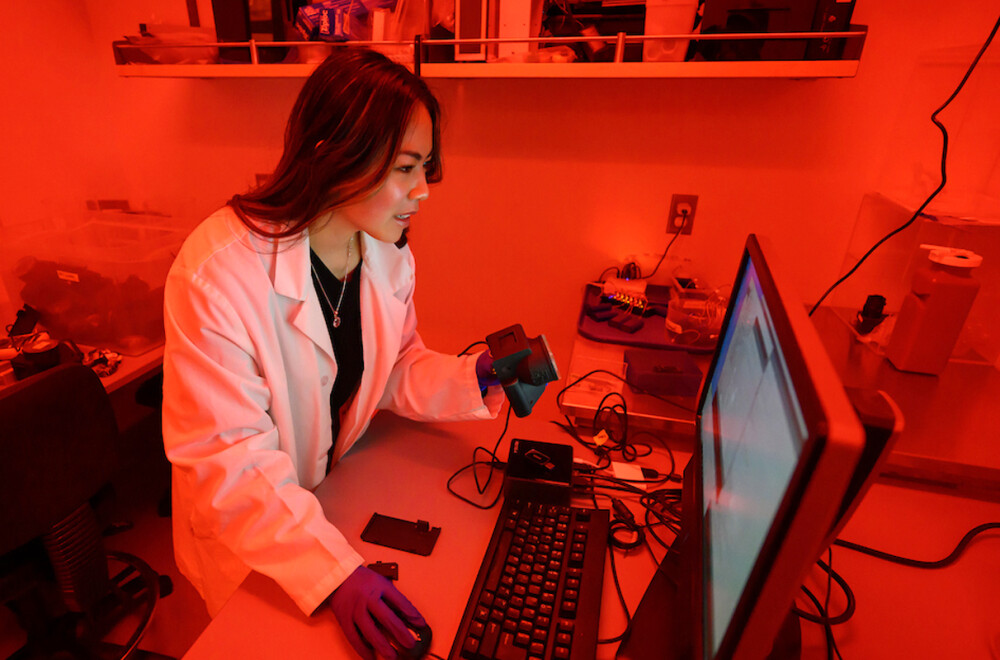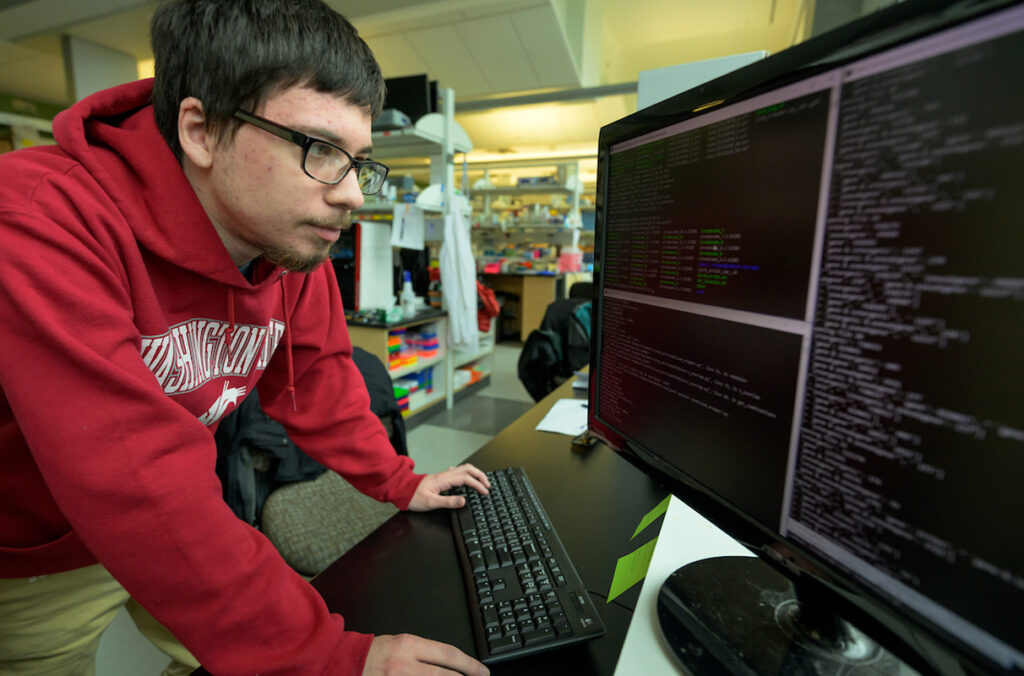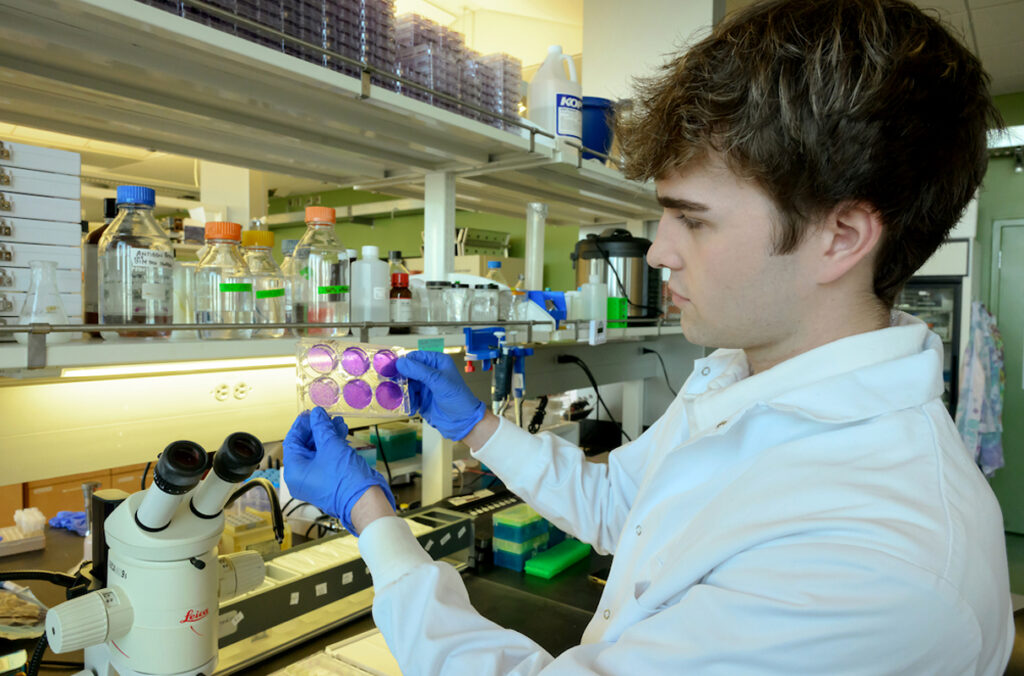WSU Undergrad research program expanding
Thursday, September 25, 2025

By Devin Rokyta, College of Veterinary Medicine
A year after launching, Washington State University’s EschLEAD program is expanding with new faculty, industry partnerships, and an advisory board to help make undergraduate science degrees more relevant and connect students to real-world career opportunities.
Initially funded by a donation from Robert (BS ’75, MS ’78) and Katherine Esch, the College of Veterinary Medicine established EschLEAD (Learn, Experience, Apply, Deliver) in the fall of 2024 to open the doors of research labs to undergraduates from any major. The program emphasizes skill development, mentorship, and meaningful research experiences that prepare students for careers in science and beyond.
“We’re building EschLEAD to show students what’s possible when you develop skills in science and related fields,” said EschLEAD professor Ryan Driskell, who established and leads the Skin Regeneration Lab in the School of Molecular Biosciences. “It’s not just about learning in the classroom. It’s about understanding how those skills translate into real-world careers, from research and data analysis to project management, sales, marketing, and more. We want students to see the full range of opportunities available to them in and around the biomedical industry.”
In its first year, EschLEAD supported 82 students across five laboratories. Students logged more than 4,000 hours of work, with the majors of participants ranging from communications and management information systems to biochemistry. Mentored by EschLEAD faculty, scholars in the program gain exposure to a range of tasks, from budgeting, web design, and conducting assays to molecular cloning and colony maintenance. Eight EschLEAD scholars graduated this past spring, and nearly all have landed roles or continued their education in graduate or professional programs that connect directly to their field of study, turning their education into a meaningful next step.
‘Real-world jobs’
Entering year two, program leaders are focusing on strengthening ties to industry to better equip students with in-demand skills and professional connections that can lead to meaningful and in-demand careers in science. Program leaders have already begun networking with biotech leaders in Seattle and Spokane that are actively hiring.
“EschLEAD is the academic bridge to relevant industries, ensuring students, and the communities that invest in them, get the greatest value from their degrees,” Driskell said. “We want education to be more than just academic — they should translate into real-world jobs.”
To help with the effort, the program has formed an advisory board of biotech and business leaders. Members include Robert Esch; Lisa Shaffer, co-founder of multiple genomics companies; Mimi Healy, CEO of Stimulus Bio; and Doug Davies, biophysics lead at University of California, Berkley. Paige Ford, a technical recruiter with Jubilant Hollister Stier, also joined to help connect students directly to job openings.
The advisory board visited Pullman in June for a multi-day retreat featuring fireside chats, presentations, and student-industry networking.
Program leaders are focusing on strengthening ties to industry to better equip students with in-demand skills and professional connections that can lead to meaningful and in-demand careers in science (photos by College of Veterinary Medicine/Ted S. Warren).
“We’re using the advisory board to shape our training around what biotech leaders say they actually need,” said EschLEAD professor Heather Koehler, whose lab in the School of Molecular Biosciences investigates viral host interactions. “It’s about giving students the skills that get them through the HR filter — and the confidence to succeed once they’re in the room.”
The program has also formed a governing committee and developed bylaws, including those that outline the process of adding and supporting new EschLEAD professors. Three additional College of Veterinary Medicine professors — Stephanie Seifert in the Paul G. Allen School for Global Health; Alan Goodman in the School of Molecular Biosciences, and Emily Qualls-Creekmore in Integrative Physiology and Neuroscience — have joined the program and opened their labs to undergraduate researchers.
Koehler said the program also plans to launch an alumni seminar series featuring professionals from industry who want to share their experiences or help shape the future of undergraduate science education. Alumni interested in participating in or supporting the program are encouraged to reach out.
“Our goal is to be the bridge between a degree and a real-world job,” Koehler said. “We want students to graduate knowing they’ve done more than earn a diploma — they’ve developed skills, built connections, and gained experience that translates into something far greater than a piece of paper.”

